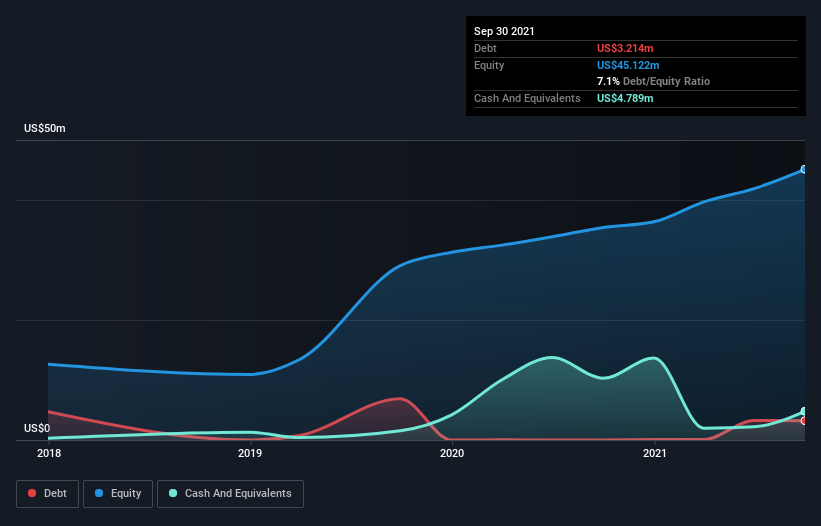HireQuest (NASDAQ:HQI) Seems To Use Debt Rather Sparingly
Howard Marks put it nicely when he said that, rather than worrying about share price volatility, 'The possibility of permanent loss is the risk I worry about... and every practical investor I know worries about.' When we think about how risky a company is, we always like to look at its use of debt, since debt overload can lead to ruin. Importantly, HireQuest, Inc. (NASDAQ:HQI) does carry debt. But the more important question is: how much risk is that debt creating?
When Is Debt Dangerous?
Generally speaking, debt only becomes a real problem when a company can't easily pay it off, either by raising capital or with its own cash flow. Ultimately, if the company can't fulfill its legal obligations to repay debt, shareholders could walk away with nothing. While that is not too common, we often do see indebted companies permanently diluting shareholders because lenders force them to raise capital at a distressed price. Of course, the upside of debt is that it often represents cheap capital, especially when it replaces dilution in a company with the ability to reinvest at high rates of return. When we think about a company's use of debt, we first look at cash and debt together.
View our latest analysis for HireQuest
What Is HireQuest's Net Debt?
As you can see below, at the end of September 2021, HireQuest had US$3.21m of debt, up from none a year ago. Click the image for more detail. However, its balance sheet shows it holds US$4.79m in cash, so it actually has US$1.57m net cash.
How Strong Is HireQuest's Balance Sheet?
Zooming in on the latest balance sheet data, we can see that HireQuest had liabilities of US$21.8m due within 12 months and liabilities of US$7.83m due beyond that. Offsetting these obligations, it had cash of US$4.79m as well as receivables valued at US$39.8m due within 12 months. So it can boast US$15.0m more liquid assets than total liabilities.
This surplus suggests that HireQuest has a conservative balance sheet, and could probably eliminate its debt without much difficulty. Simply put, the fact that HireQuest has more cash than debt is arguably a good indication that it can manage its debt safely.
Fortunately, HireQuest grew its EBIT by 8.1% in the last year, making that debt load look even more manageable. When analysing debt levels, the balance sheet is the obvious place to start. But it is HireQuest's earnings that will influence how the balance sheet holds up in the future. So if you're keen to discover more about its earnings, it might be worth checking out this graph of its long term earnings trend.
Finally, while the tax-man may adore accounting profits, lenders only accept cold hard cash. HireQuest may have net cash on the balance sheet, but it is still interesting to look at how well the business converts its earnings before interest and tax (EBIT) to free cash flow, because that will influence both its need for, and its capacity to manage debt. Over the last three years, HireQuest actually produced more free cash flow than EBIT. That sort of strong cash generation warms our hearts like a puppy in a bumblebee suit.
Summing up
While we empathize with investors who find debt concerning, you should keep in mind that HireQuest has net cash of US$1.57m, as well as more liquid assets than liabilities. The cherry on top was that in converted 130% of that EBIT to free cash flow, bringing in US$17m. So we don't think HireQuest's use of debt is risky. Another factor that would give us confidence in HireQuest would be if insiders have been buying shares: if you're conscious of that signal too, you can find out instantly by clicking this link.
At the end of the day, it's often better to focus on companies that are free from net debt. You can access our special list of such companies (all with a track record of profit growth). It's free.
Have feedback on this article? Concerned about the content? Get in touch with us directly. Alternatively, email editorial-team (at) simplywallst.com.
This article by Simply Wall St is general in nature. We provide commentary based on historical data and analyst forecasts only using an unbiased methodology and our articles are not intended to be financial advice. It does not constitute a recommendation to buy or sell any stock, and does not take account of your objectives, or your financial situation. We aim to bring you long-term focused analysis driven by fundamental data. Note that our analysis may not factor in the latest price-sensitive company announcements or qualitative material. Simply Wall St has no position in any stocks mentioned.

